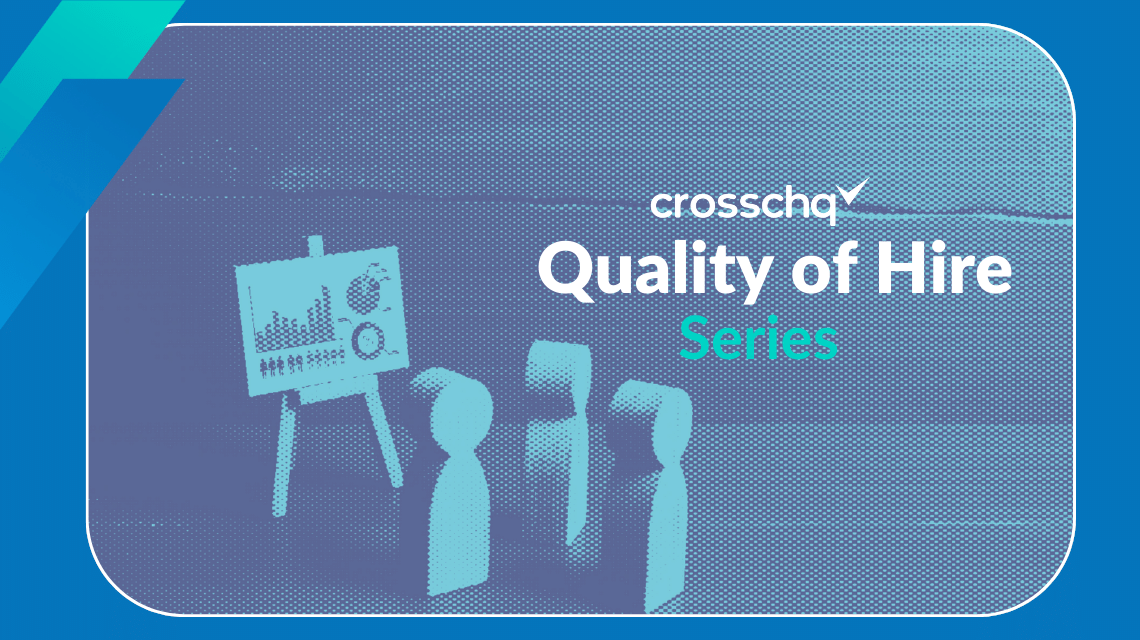

Crosschq Blog
Reference Check Questions for Leadership Positions

We’ve seen the “Great Resignation,” quiet firing, quiet hiring, and the “Great Layoff” all in a matter two-to-three years. The advent of a hybrid work environment and the restructuring of the workforce in a post-pandemic work world has galvanized a lot of these changes, but some argue it has more to do with leadership and new employee expectations than anything else.
A 2021 Leadership Transitions Report found that:
- 79% of workers quit their jobs due to a lack of appreciation
- 77% of organizations feel they don’t have adequate leadership
- 63% of millennials felt their leadership skills were not being fully developed
- 58% of leaders feel they did not receive enough training
Poor leadership from unqualified or undertrained leaders can lead to a whole host of problems, especially if you need to fill a time-sensitive role. From employee engagement and meeting deadlines to company culture and cultivating a positive workplace environment, it all starts with leadership.
The Importance of Reference Check Questions for Leadership Positions
A Gallup study found that leaders account for at least 70% of employee engagement, which means that your levels of employee productivity, engagement, and enthusiasm at work depend a lot on your leadership.
Reference check questions need to identify if your candidate has the skill set to organize, lead, and motivate a workforce, however big or small it is. Although reference checks aren’t everything, they’re a valuable aspect of a holistic and optimized recruiting process, allowing you to verify skills, experiences, and work history.
Reference Check Questions for Leaderships Positions
You model the following reference check questions in your own search for a leader.
What was it like working with or under _____?
This is a great opener that will help jog your reference's memory and give them an opportunity to make some general statements about their experiences with the candidate.
What was _____’s leadership style like? What were the pros and cons of that style?
This is a good question that will allow your reference to get a little deeper into what kind of leader the candidate was. If there are any red flags or serious problems in the candidate’s history, they will likely come up here.
How did _____ motivate their team members?
A lack of motivation and approval from leaders are high complaints among workers today. You need a leader who can bring out the best in their workers and be a motivational figure.
Can you provide one example of a successful project that _____ led or organized?
This is a great way to get some concrete details about how your leadership candidate accomplished a task and demonstrated their leadership style.
Was _____ a clear and transparent communicator? Why or why not?
80% of employees say that open communication is important to them, and teams with effective communication strategies outperform the competition by 3.5 times… which means communication style should be a top priority when evaluating leadership roles.
How was the _____’s relationship with their leaders, peers, and team members?
Collaboration is essential with other team leaders as well as employees, and this question will help you get an idea of how effective of a communicator your candidate is.
Would you rehire _____? Why or why not?
This is one of the most important questions you could ask anyone for a reference check, regardless of what position you need to fill. It’s a polarizing question that asks the former employer to identify any red (or green) flags.
Should You Conduct Reference Checks at the Beginning or End of the Hiring Process for Management Positions?
The best time to conduct a reference check is at the beginning of the hiring process. Here’s why:
- Reference checks conducted at the beginning of the hiring process help identify red flags as quickly as possible. You don’t want to spend time and resources on a candidate only to find out their resume was misleading or inaccurate.
- Reference check questions help inform the interview process, giving you more details and personal accounts of your candidate’s work experience.
- Even with automated reference checks, it might take some time for the references to respond. Waiting until the very end of the hiring process to conduct your reference check could slow the entire process down, which is the last thing team leaders need when they’re trying to fill a time-sensitive role.
Automating the Reference Check Process for Leadership Positions
Team leaders, recruiters, and corporate executives want to find quality candidates in the shortest possible amount of time. Traditional reference checks were done manually, which made them slower and less accurate. With digital automated reference check solutions, like Crosschq, you can:
- Compare reference check scores with self-reference scores
- Reduce your overall hiring turnaround time by 85%
- Gather candidate reports within 48 hours
- Streamline your efforts directly from your ATS
- Aggregate data on candidate skills, strengths, and weaknesses
The Importance of Reference Checking Leadership Positions and Quality of Hire
Finding a hiring leader in a timely matter isn’t just a matter of meeting deadlines or benchmarks; the decline in productivity, engagement, and morale with a lack of leadership could cost you hundreds of thousands a year. Crosschq’s automated reference check technology will enable you to find a quality leader without the time sacrifice of manual reference check processes.
Crosschq’s “Q” Report looked at 24+ million pre-hire and post-hire decisions we’ve helped leaders make, along with the radical insights from those data points that can help you hire more efficiently than ever before. Want to learn more about how Crosschq can help you attract the right leaders? Sign up for a demo today.
Take the Guesswork
Out of Hiring
Schedule a demo now



%20-200x43.png)





